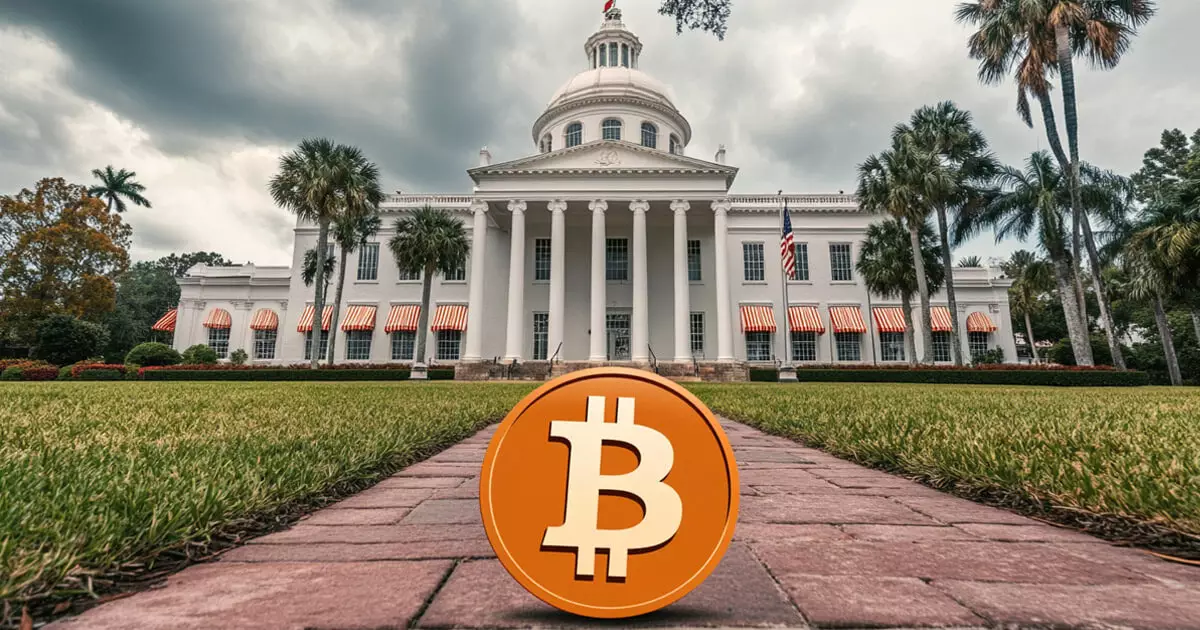In an era where financial independence is increasingly desired, Florida’s recent legislative strides toward integrating Bitcoin (BTC) into its state financial reserves represent a pivotal milestone. Senator Joe Gruters, with his forward-thinking approach, highlights how Florida is not just adapting to the shifting financial landscape but is poised to lead the charge. With Bill S0550, which permits the allocation of up to 10% of key state funds into Bitcoin, Florida is making a bold statement. This move is not merely about adding a cryptocurrency to the mix; it’s about redefining how state-level financial systems operate in a modern economic context.
Gruters emphasized the significance of this legislation as part of a much broader economic strategy, one that emphasizes inflation protection and fiscal autonomy. His vision is commendable, recognizing that our traditional financial systems may not be sufficient to withstand the economic challenges ahead. As inflation continues to rear its ugly head, introducing Bitcoin into the state’s financial framework presents a proactive solution that offers both security and opportunity.
The Call for Financial Sovereignty
Florida’s embrace of Bitcoin reflects an urgent call for financial sovereignty in a world dominated by centralized banking systems. Gruters articulates a vision that extends beyond financial returns; he envisions a Florida that firmly stands for freedom and individual autonomy. In a time when economic uncertainty is pervasive, having alternative investment avenues could empower both the state and its residents.
The endorsement of Bitcoin strategies by influential figures, including former President Donald Trump, underscores a broader political realignment towards digital assets. For Gruters and those who share his beliefs, it’s clear that cryptocurrencies represent not just a financial instrument, but an ideological stance—one that prioritizes personal liberty and innovation over bureaucratic constriction. This ideological foundation could well cultivate a fertile ground for technology-driven economic growth.
Attracting Economic Refugees
Florida’s burgeoning role as a sanctuary for so-called “economic refugees” speaks volumes about the state’s appeal. Gruters has painted a vivid picture of a state pursuing both freedom and opportunities, inviting those disillusioned by restrictive fiscal policies in other states. The COVID-19 pandemic highlighted this trend, as many residents sought a haven in Florida—one that promises lower taxes, regulatory clarity, and now, an innovative financial landscape teeming with cryptocurrency potential.
The allure of Florida is becoming increasingly evident; it’s not merely a geographic location but a symbol of hope for those seeking a financial environment conducive to personal and economic growth. By nurturing an ecosystem favorable to digital assets, Florida is positioning itself as a beacon for progressive economic policies that prioritize both individual rights and state autonomy.
Influencing National Policy
Gruters holds firm to the belief that Florida’s policy direction will ripple through the rest of the nation. As the state adopts more forward-thinking financial strategies, it sets a precedent for other states to follow suit. With Gruters characterizing the Sunshine State as “the place to be,” his confidence in Florida’s leadership potential suggests that a domino effect could encourage other states to reevaluate their own fiscal strategies.
As state and local governments grapple with budget shortfalls and increasing demands for transparency, Florida’s adoption of Bitcoin could serve as a critical case study. The implications of this legislation extend beyond Florida; they act as a clarion call for other states to reevaluate their financial schemes. Many may benefit from considering the advantages of a diversified portfolio that includes digital assets to combat inflation and cultivate economic stability.
The Future of Bitcoin in National Reserves
Looking beyond state borders, Gruters envisions Bitcoin playing an integral role in shaping national reserves. The concept of a digital currency as a strategic reserve for the United States could fundamentally alter the context in which financial sovereignty operates, positioning Bitcoin not just as an asset class, but as a cornerstone of national economic strategy.
This paradigm shift would require a rethinking of conventional fiscal policies and a move toward innovative compliance frameworks that can accommodate digital currencies. Florida’s leadership in this domain could very well influence federal policies, signaling a transition away from rigid, outdated financial systems towards a more flexible, resilient future.
Innovative ideas like those championed by Gruters provide hope that states can be laboratories of democracy—testing and implementing policies that prioritize economic freedom, personal agency, and a modern understanding of financial systems. This evolution must be embraced, not just for the sake of profit but to align with the principles of individual freedom and a robust economic framework.

